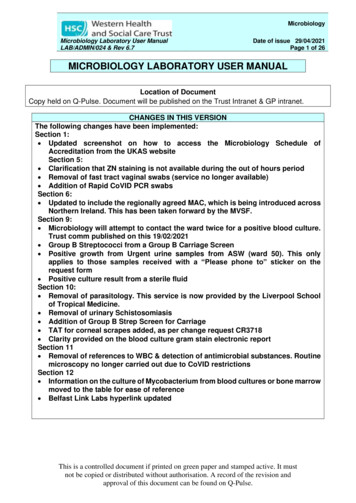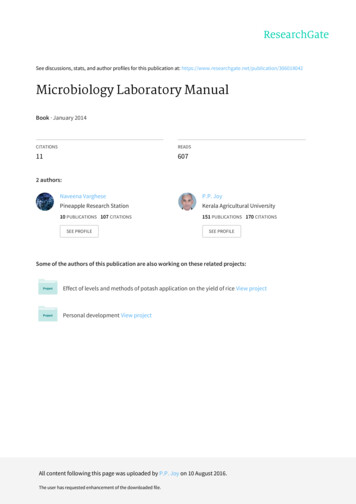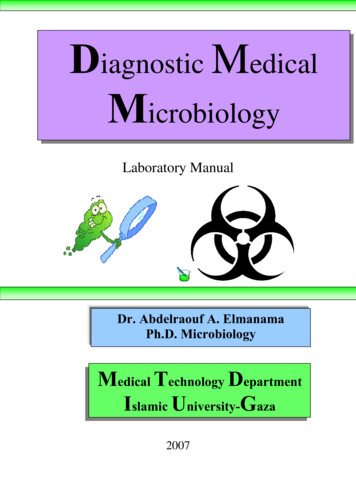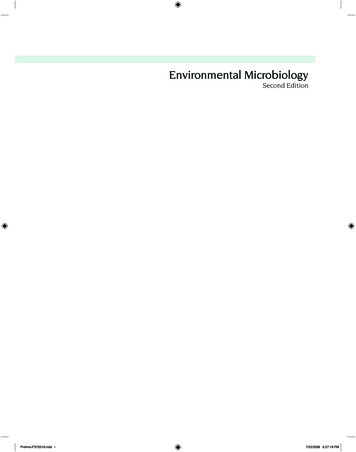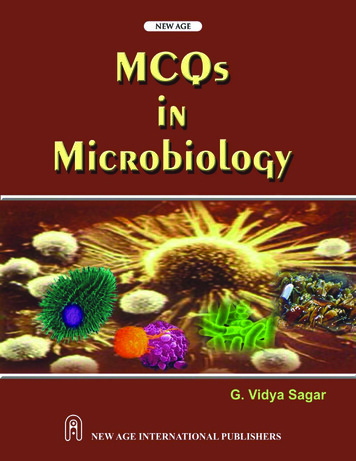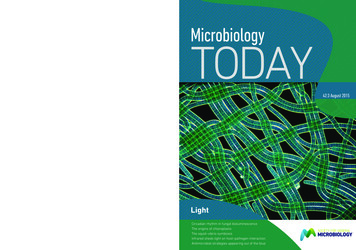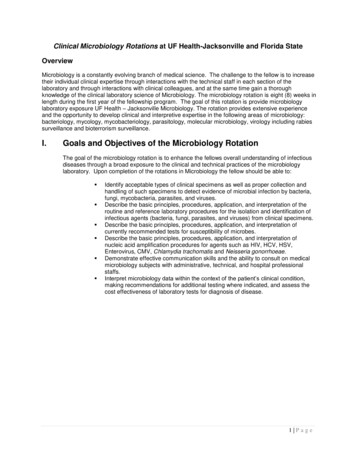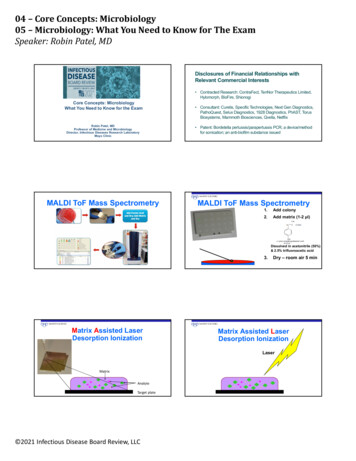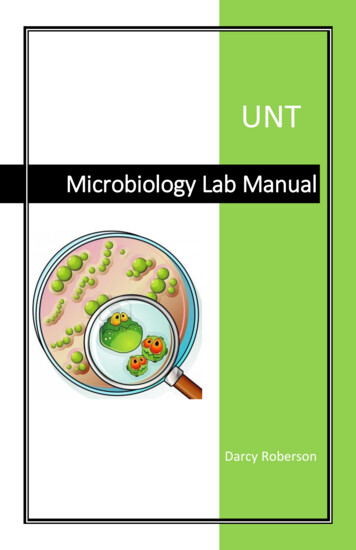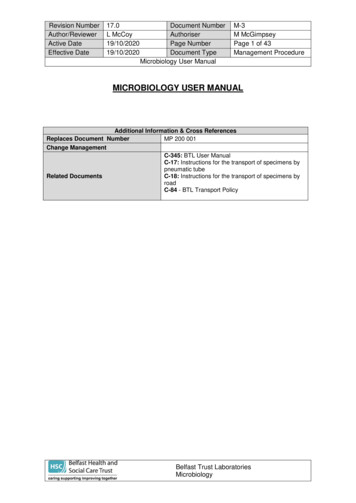
Transcription
Revision NumberAuthor/ReviewerActive DateEffective Date17.0L McCoy19/10/202019/10/2020Document NumberAuthoriserPage NumberDocument TypeMicrobiology User ManualM-3M McGimpseyPage 1 of 43Management ProcedureMICROBIOLOGY USER MANUALAdditional Information & Cross ReferencesReplaces Document NumberMP 200 001Change ManagementC-345: BTL User ManualC-17: Instructions for the transport of specimens bypneumatic tubeRelated DocumentsC-18: Instructions for the transport of specimens byroadC-84 - BTL Transport PolicyBelfast Trust LaboratoriesMicrobiology
Revision NumberAuthor/ReviewerActive DateEffective Date17.0L McCoy19/10/202019/10/2020Document NumberAuthoriserPage NumberDocument TypeMicrobiology User ManualM-3M McGimpseyPage 2 of 43Management ProcedureMicrobiology DepartmentGeneral InformationDepartment of Medical MicrobiologyKelvin Building, Royal Victoria Hospital, Grosvenor Road, Belfast, BT12 6BADX 3864NRLaboratory Contacts:Laboratory Enquiries / Advice028 961 55645Virology Specific Enquiries028 961 55645Specialty Improvement LeadDr Conall McCaughey028 961 55681Laboratory Manager - MicrobiologyMr Mark McGimpsey028 961 51576Quality OfficerDr Lisa McCoy028 961 51596Operational Manager - BacteriologyMrs Nicola Wolseley028 961 51596Operational Manager - Molecular andMrs Carmela Duffy028 961 51644Serology ServicesMedical Contacts:Duty VirologistDr Conall McCaughey07889086946(Clinical Virology advice Mon – Fri 9am –Dr Susan Feeney5pm)Dr Tanya CurranDr Alison WattMedical Microbiology RegistrarsOffice028 961 51588 /(clinical advice Mon – Fri 9am – 5pm)028 961 51589Pager (urgent only)1425Medical Microbiology ConsultantsDr Wesam Elbaz028 906 34020Dr Colin Goldsmith028 906 39086Dr Laura Loughlin028 906 39461Dr Katie Fong028 906 34119Dr Anne Loughrey028 906 34112Dr Elaine McHenry028 906 34110Dr Ronan McMullan028 906 35304Dr Grace Ong028 906 34580Dr Paul Rooney028 906 34119Dr Judith Troughton028 906 39461Out of Hours Contacts:Urgent Out of HoursMicrobiology Laboratory028 961 58944 orBiomedical Scientist07717731904VirologyContact SwitchboardMedical MicrobiologistContact SwitchboardN. Ireland Public Health Laboratory:Public Health LaboratoryNIPHL028 9504 1243Belfast Health and SocialCare TrustLisburn RoadBelfastNorthern IrelandBT9 7ADBelfast Trust LaboratoriesMicrobiology
Revision NumberAuthor/ReviewerActive DateEffective Date17.0L McCoy19/10/202019/10/2020Document NumberAuthoriserPage NumberDocument TypeMicrobiology User ManualM-3M McGimpseyPage 3 of 43Management ProcedureLaboratory ServicesThe laboratory offers consultant-lead scientific and clinical advice and interpretationon a comprehensive range of tests for the microbiological investigation of patients.Microbiology service comprises: General Bacteriology N. Ireland Mycobacterial Reference Laboratory Mycology N. Ireland Public Health Laboratory (based on the City Hospital site)Regional Virology Services: Serology Molecular services (diagnostics, theranostics, epidemiology and typing)Our aim is to provide the highest quality of service with prompt delivery of accurateresults, (backed up by specialist medical and scientific expertise). Where specific testsare not available locally, they will be referred to colleagues in other centres.When test is sent to a reference laboratory, every effort is made to use a PHErecognised laboratory, the details of which will be published with the result received.Further information on the reference laboratories used can be obtained by contactingthe Quality Officer.Comments and ComplaintsIf you have a comment, compliment or complaint about our service, please let us knowby contacting the quality officer who will try to help resolve the issue.The laboratory has documented policies on Data Protection, Protection of PersonalInformation and Complaints and Compliments available through the trust Laboratory-MortuaryServices.htm.Clinical Advice and InterpretationClinical advice or interpretation of results is available at all times for Belfast Trust andRegional Users. See contact details provided above.Clinical advice or interpretation of results is available at all times for Belfast Trust andRegional Users. See contact details provided above.For GP Practices in the South East area where virology/serology samples areprocessed in the Regional Virus Laboratory, interpretation of results and associatedclinical advice is available from the Duty Virology Team (Tel: 07889086946) in normalworking hours or via Switchboard in out of hours periods. General clinical advice forvirology and serology testing is available on a 24/7 basis for all NI trusts.Belfast Trust LaboratoriesMicrobiology
Revision NumberAuthor/ReviewerActive DateEffective Date17.0L McCoy19/10/202019/10/2020Document NumberAuthoriserPage NumberDocument TypeMicrobiology User ManualM-3M McGimpseyPage 4 of 43Management ProcedureFor clinical/antibiotic prescribing advice related to bacteriology specimens, pleasecontact SEHSCT microbiology consultants on 02890 411561.If Medical Microbiology input on ward rounds is sought by Consultant Medical staffthis should be discussed directly with the Medical Microbiology Consultants.During working hours (Mon-Fri 09:00-17:00):Contact the Laboratory Staff or Medical Microbiology team as appropriate.Out of hours:For urgent test requests:Contact the Biomedical Scientist out of hoursFor clinical advice:Bacteriology: Contact on-call Medical Microbiology via switchboard.Virology:Contact the Microbiology Laboratory Biomedical Scientist in the firstinstance. If necessary, out of hours requests and requests for medicaladvice may be referred to a consultant virologist.Test Request InformationRequests should be written on the green and white Microbiology request form with theexception of Regional Virology, Molecular and Serology, where dedicated forms forspecific services are available from the documents section of the laboratory website:http://www.rvl-belfast.hscni.net.Requests can also be generated by Ordercomms. Place the request form in the extrapocket of the plastic sample bag or attach it outside with an elastic band. Do not staplethe form to the bag.Completion of Request FormsPlease avoid the terms “viral screening”, “routine virology”, “viral studies” or “viraltitres” as these terms are confusing and unhelpful. Instead, please provide briefpatient clinical details and duration of illness, which allows us to choose appropriatetests.Minimum Patient IdentifiersIn order to fully identify a patient and send a full report back to the requesting source,the request must contain the following information:Belfast Trust LaboratoriesMicrobiology
Revision NumberAuthor/ReviewerActive DateEffective Date17.0L McCoy19/10/202019/10/2020Document NumberAuthoriserPage NumberDocument TypeMicrobiology User ManualEssential Sample RequestFormHTADonorSample:RequestForm &sample M-3M McGimpseyPage 5 of 43Management ProcedureDesirableUnique Identification NumberWhere H&C number is available thisMUST be usedForenameSurnameDate of Birth (dd/mm/yyyy)Unique Identification NumberWhere H&C number is available thisMUST be usedForenameSurnameDate of Birth (dd/mm/yyyy)Test (s) RequestedAnatomical site and type of specimenDestination for report Date & time Destination for report Relevant clinical information** MRSA/ESBL/CPO status etc Date & time of sample collection(sometimes essential) Gender of patient Address of patient Name of Consultant / GP /requesting practitioner Identity of person collecting thesampleUnique donor ID code(unique patient identification numbere.g. H&C/Hosp. number)TimePlace**Please indicate if an unusual or fragile organism is suspected as the causalagent, these may not be isolated by normal testing protocols and may requirespecial media, special isolation conditions and prolonged incubation.Belfast Trust LaboratoriesMicrobiology
Revision NumberAuthor/ReviewerActive DateEffective Date17.0L McCoy19/10/202019/10/2020Document NumberAuthoriserPage NumberDocument TypeMicrobiology User ManualM-3M McGimpseyPage 6 of 43Management ProcedureSupplies InformationAll swabs, sample bags, request forms etc. can be obtained from the Belfast Trustcentral stores (028 90353418).Urgent RequestsIt is essential that all request forms for emergency sample investigation are labelledaccordingly and prior arrangements made with the laboratory by phoning theappropriate laboratory during normal working hours:DepartmentTelephone NoWorking HoursBacteriology028 961 58944Mon – Fri 08:00 – 20:00NIMRL028 906 35798Mon – Fri 09:00 – 17:15Mycology028 961 51597Mon – Fri 09:00 – 17:15Serology028 961 51564 /51565Mon – Fri 09:00 – 17:15Molecular028 961 51643Mon – Fri 09:00 – 17:15Typing028 961 51646Mon – Fri 09:00 – 17:15Out of Hours RequestsPlease contact the Microbiology Biomedical Scientist when sending an urgentsample for testing.Requesting additional examinationsIf requesting a further test, this should be requested as soon as possible after receivingthe original report and will be dependent on specimen retention, quality and volumerequirement issues. Additional requests will be either added to the original request ora new request generated as appropriate. Please note that for serological assaysperformed in-house, results are only valid when specimens are tested within thevalidated timeframe of the assay. Please consult the test repertoire table todetermine the validated timeframe for testing prior to requesting further tests.Labeling High Risk SamplesFor suspected or known Category 3 pathogens, hazard warning Category 3 pathogenlabels should be affixed both to the container and the accompanying request form. Ifthere is any doubt as to whether a specimen is high risk, please contact theMicrobiology laboratory.Hazard Group 3 is defined as a biological agent that may cause severe humandisease and presents a serious hazard to employees; it may present a risk ofspreading to the community, but there is usually effective prophylaxis or treatmentavailable.Belfast Trust LaboratoriesMicrobiology
Revision NumberAuthor/ReviewerActive DateEffective Date17.0L McCoy19/10/202019/10/2020Document NumberAuthoriserPage NumberDocument TypeMicrobiology User ManualM-3M McGimpseyPage 7 of 43Management ProcedureNB: Hazard warning Category 3 pathogen labels should be affixed to ALL samplestaken from patients with pyrexia of unknown origin (PUO) following foreign travel.Belfast Trust LaboratoriesMicrobiology
Revision NumberAuthor/ReviewerActive DateEffective Date17.0L McCoy19/10/202019/10/2020Document NumberAuthoriserPage NumberDocument TypeMicrobiology User ManualM-3M McGimpseyPage 8 of 43Management ProcedureExamples of Category 3 Pathogens Bacteria:Bacillus anthracis (Anthrax)Brucella speciesEscherichia coli, vero-cytotoxigenic strains (e.g.: O157: H7 and others)Mycobacterium tuberculosisSalmonella typhiSalmonella paratyphiShigella dysenteriae (Type 1) Fungi:Blastomyces dermatitidisCoccidioides immitisHistoplasma speciesParacoccidioides brasiliensisPenicillium marneffei Viruses:All viral hepatitis (except Hepatitis A)HIVSevere Acute Respiratory Syndrome (SARS) Prion Proteins:Transmissible spongiform encephalopathies (TSE) e.g: the agents of CreutzfeldtJacob disease (CJD): variant Creutzfeldt-Jacob disease (vCJD)Fatal familial insomniaGerstman-Straussler-Scheinker syndromeKuruHazard Group 4 is defined as a biological agent that will cause severe human diseaseand is a serious hazard to employees; it is likely to spread to the community, and thereis usually no effective prophylaxis or treatment available.If you suspect a group 4 pathogen e.g. Lassa, Marburg, Ebola and Crimean,please contact the Duty Virologist and Infectious Diseases team.Duty Virologist: During working hours (9am-5pm) 07889086946 and Out of Hoursvia Switchboard)Infectious Diseases Team: via SwitchboardUnder NO circumstances should any samples be taken from such patientswithout prior consultation.Belfast Trust LaboratoriesMicrobiology
Revision NumberAuthor/ReviewerActive DateEffective Date17.0L McCoy19/10/202019/10/2020Document NumberAuthoriserPage NumberDocument TypeMicrobiology User ManualM-3M McGimpseyPage 9 of 43Management ProcedureGuidelines for Proper Specimen Collection and Factors That MayAffect the Quality of the Results: Confirm the identity of the patient either verbally and/or by hospital identificationwristband.Complete the request form.Check that the patient is appropriately prepared. This will obviously differdepending on the nature of the sample(s) being taken.To comply with the Human Tissue Act legislation (Human Tissue Act, 2004), itis the responsibility of the requester to ensure that the patient has beeninformed of, and has consented to, the tests being requested.Where patient or donor consent is required it is the responsibility of therequester to ensure the subjects of any tests have given informed consent.Unless written notice is received to the contrary, consent for investigations andthe use of any surplus sample in scheduled purposes (quality control, staffdevelopment or ethics committee approved research) will be assumed.Ensure the specimen(s) is collected correctly. It is important that the laboratoryreceive good quality samples. Guidance on sample collection especially thosesamples that are naturally eliminated from the body and hence can often becollected by the patient can be found on the website http://labtestsonline.org.uk/(further information can also be found by following the links in the specificsample types detailed below).Collect specimen before administering antimicrobial agents when possible.Check that the sample container is labelled correctly. Use sterile containers andaseptic technique to collect specimens to prevent introduction of microorganisms during invasive procedures. Only laboratory approved, CE marked,in vitro devices IVDs, must be used as primary specimen containers, nosubstitutes or improvised containers.Collect an adequate amount of specimen. Inadequate amounts of specimenmay yield false-negative results. If multiple samples are collected at the sametime ensure there is no interchange of samples.Specimens obtained using needle aspiration should be transferred to a sterilecontainer and transported to the laboratory as soon as possible. If there is onlya small volume of material in the syringe, add some sterile preservative-freesaline, mix and transfer to a sterile container. Do not send needle or syringe.All materials used in specimen collection should be disposed of safelyaccording to local protocols used in specimen collection area.See BHSCT policy TP066/11: Trust waste policy found on BHSCT website andHealth Technical Memorandum 07-01: Safe management of healthcare wastefound on DoH website.All high risk samples MUST be identified to facilitate the correct processing ofsuch samples by laboratory personnel.Any spillages or breakages occurring during sample collection must be dealtwith correctly according to a documented procedure.Belfast Trust LaboratoriesMicrobiology
Revision NumberAuthor/ReviewerActive DateEffective Date 17.0L McCoy19/10/202019/10/2020Document NumberAuthoriserPage NumberDocument TypeMicrobiology User ManualM-3M McGimpseyPage 10 of 43Management ProcedureAll container tops must be firmly and properly closed, leakage adversely affectsnot only that specimen but other specimens sharing the transitThe date and time of collection should be clearly stated (24 hr clock)Fragile organisms may be affected by a delay in transport.Specimens must be kept in a cool room awaiting dispatch, not in the sunlightor near a radiator. Ensure the samples are stored under the appropriate storageconditions for the investigation required.Transit to the laboratory should be prompt and specimens must not be left inuncontrolled vehicles (hot/cold) for any prolonged period.If processing is delayed, refrigeration is preferable to storage at ambienttemperature. Delays of over 48h are undesirable.Indicate if an unusual or fragile organism is suspected as the causal agent,these may not be isolated by normal testing protocols & may require specialmedia, special isolation conditions & prolonged incubation.To minimise the risk and ensure the safety of the specimen collector, carrier,general public and the receiving laboratory, it is important that care is takenwhen collecting and handling clinical samples to ensure that the risk of infectionto staff is kept to an absolute minimum. Therefore:o Samples must always be carried in closed sealed plastic bags placed inclosed sealed boxes.o Safe working practices shall be observed at all times.o All clinical samples must be placed inside a sealed plastic bag.o Should any urgent samples be sent outside of normal laboratory hours (0900– 1715) they will be transported in sealed plastic bags.o Samples must never be carried unprotected in the open hand or given toother members of staff in this way.o Patient confidentiality must be preserved by the use of envelopes or opaqueplastic bags.o Samples must always be carried in closed boxes which are clearly markedwith a BIOHAZARD label. Samples must never be thrown into a large plasticbag and transported in this manner.o The containment of samples within motor vehicles, used to transportsamples, must be such as to restrain, retain and protect the contents in theevent of an accident.Belfast Trust LaboratoriesMicrobiology
Revision NumberAuthor/ReviewerActive DateEffective Date17.0L McCoy19/10/202019/10/2020Document NumberAuthoriserPage NumberDocument TypeMicrobiology User ManualM-3M McGimpseyPage 11 of 43Management ProcedurePackaging and Transportation of SamplesAdvice on packaging samples for transport to the LaboratoryInstructions can be found on the Belfast Trust website, or requested from thelaboratory:C-17 - Pneumatic tube transport of specimensC-18 - Road transport of specimensC-84 - BTL Transport PolicyThe manager of every Ward, Clinic, or GP which sends specimens to the Belfast TrustLaboratories must read these and must ensure their unit complies with thesedirections. The Carriage of Dangerous Goods Regulations (2011) and ADR (2017)place a clear legal responsibility on the sender and any agent they use to transportdiagnostic specimens by road. Internal transfer to the laboratories by the pneumatictube system is subject to risk assessments made under the HSAW order and theCOSHH regulations.Transportation of SamplesThere is a legal responsibility and a duty of care on anyone who dispatches clinicalmaterial (diagnostic specimens) to the Belfast Trust Laboratories. The legalresponsibility is to ensure that if required, the specimens are packaged and labelled incompliance with the relevant road transport regulations (ADR/CDG). There is a furtherlegal responsibility under COSHH regulations, since clinical materials may containinfectious agents, to ensure that the materials do not leak or injure anyone involved inthe transportation or the wider public and environment.The duty of care (to the patient) is to ensure that the transport conditions do notdamage the material being sent for testing or otherwise interfere with the validity of thetest results, and to ensure the specimen reaches the laboratory in good conditionwithin an appropriate time frame for good clinical management of the case. Specimensshould be clearly labelled and dated. Place all specimens in leak proof containers insealed plastic bags.NB: Category 3 samples should be double bagged and clearly identified. Samples from the Royal Group of Hospitals can be sent via the vacuum tubesystem (except cat 3 samples) or by hospital courier.Samples from other hospitals / GPs may be sent by the relevant dispatchsystems.Category B specimens and all other diagnostic specimens sent by DataDispatch must be packed to at least PI 650 standard. No additionaltransportation documentation is required for these specimens.Individual couriers such as the Post Office may issue their own additionalrequirements and restrictions, which must be complied with.Belfast Trust LaboratoriesMicrobiology
Revision NumberAuthor/ReviewerActive DateEffective Date17.0L McCoy19/10/202019/10/2020Document NumberAuthoriserPage NumberDocument TypeMicrobiology User ManualM-3M McGimpseyPage 12 of 43Management ProcedureAny referring Unit, Hospital, Clinic, GP Practice or Trust transporting specimens byroad (which includes postal services) should take professional advice and guidanceon the packaging and labelling of any materials they hand over for transportation.The laboratories are not responsible for nor do they have any managerial control overthe transportation of specimens between the shipper and the destination. The strongrecommendation by Belfast Trust Microbiology is that all patient Clinical Specimensshould be considered as potentially infectious and must therefore be categorised atthe very minimum as UN3373 Biological Substance Category B and be packed andlabelled according to Packing Instruction P650 in the ADR/CDG regulations. (Thepackaging standard comprises 3 layers, two leak proof layers, and a third outer rigidlayer which provides protection against impact.)If fully compliant with P650 then the package, the transport vehicle and the driver arenot subject to further specific requirements under ADR.THIS EXEMPTION MUST ALWAYS BE USEDIf the packaging is not P650 compliant then there is no exemption from the fullADR/CDG regs, and the shipper and the driver will probably be found in breach of anumber of transport regulations and liable to prosecution.All users’ will be contacted immediately if specimens are received that do not meetwith the stated packaging and transport requirements and informed as to how toeliminate recurrence.Data DispatchUnit 33,Westlink Ent Park30-50 Distillery St,BelfastBT12 5BJTel : 02890311022Criteria for Rejection of SpecimensSpecimens may be rejected immediately if: Form Received with no specimen Discrepancy between the patient details on the form and the specimen No patient details on either the request form or the specimen Specimens which have leaked and are insufficient for testing Specimens deemed unsuitable for testing by BMS or clinical scientist at thepoint of testing Specimens accompanied by a request form with insufficient information tosend out a report or to determine which test is required.If a sample is unsuitable for testing a report will be sent to the requestor giving thereason and requesting another sample.Belfast Trust LaboratoriesMicrobiology
Revision NumberAuthor/ReviewerActive DateEffective Date17.0L McCoy19/10/202019/10/2020Document NumberAuthoriserPage NumberDocument TypeMicrobiology User ManualM-3M McGimpseyPage 13 of 43Management ProcedureWhen blood cultures are received that do not meet the minimum identifier set everyeffort will be made to contact the ward/department by telephone to advise that thesample is to be rejected and a repeat sample is necessary.The laboratory may choose to process a sample that may otherwise have beenrejected by cooperating with users in clarifying the request.In the case of CSF, tissues, bronchial washes and irreplaceable fluids for TB cultureand other such samples which cannot or are extremely difficult to repeat, thelaboratory will contact the ward/department to clarify the patient identifier set. Note willbe taken as to whom communication has been made and included as a laboratorycomment on the report.In other instances, the final report will have a laboratory comment which indicates theproblem and if caution need be applied when interpreting the result.ResultsFinal reports for both routine and emergency requests can be viewed on BHSCT‘Labcentre’, the HSC ‘NIECR’ system or alternatively on cyberlab. These may beaccessed in your relevant ward or practice as soon as they are validated by laboratorypersonnel. Please make use of this facility.Please note:For BSHCT microbiology results, ‘NIECR’ may not display specimen types (or the siteof origin for a swab), pending results, or test data on patients whose examinationswhere supplied without an H&C number. For many tests results are better accessedon LabCentre browser look up where tests, results and interpretative comments aredisplayed together. Should any uncertainty exist on lookup, please contact thelaboratory for further information.For serological assays performed in-house, results are only valid whenspecimens are tested within the validated timeframe of the assay. Pleaseconsult the test repertoire table to determine the validated timeframe for testing.The issuing of results of a non-urgent nature over the phone is discouraged and mustbe kept to an essential minimum in the interests of safety as verbal reports may leadto transcription errors.If a phone enquiry is necessary, where possible consult labcentre to obtain the onscreen laboratory test request number. This is in order to validate that you areauthorised to receive the confidential laboratory report in question and will assistlaboratory staff in dealing with your enquiry more efficiently.All laboratory results should be interpreted in conjunction with the clinicalstate of the patient.Belfast Trust LaboratoriesMicrobiology
Revision NumberAuthor/ReviewerActive DateEffective Date17.0L McCoy19/10/202019/10/2020Document NumberAuthoriserPage NumberDocument TypeMicrobiology User ManualM-3M McGimpseyPage 14 of 43Management ProcedureIf inappropriate results are received, please contact the laboratory and/or repeat thespecimen.Frequency of requesting examinationsHow often a test should be repeated, if at all, should be based on a number ofcriteria: The physiological properties Biological half-life Analytical aspects Treatment and monitoring requirements Established guidanceThe Royal College of Pathologists have published advice on the minimum retestingintervals in 1F-4482-B08303CE3907020D/For further advice on the use of the services provided, please contact the laboratory.Test Repertoire:The Microbiology laboratory is a UKAS accredited testing laboratory No. 8704The test schedule listing accredited tests can be found on the UKAS ns/ . For any tests not currently on theschedule, the further information section of the repertoire table will state nonaccredited test.For a number of serological assays, the results are only valid if the sample istested within the validated time period of the assay. Where applicable, thevalidated testing period is detailed in the further information section of the testrepertoire table.Referred testsAny tests sent to a referral laboratory for testing or confirmation will be clearly markedon the result report. Details of all tests sent to referral laboratories and theaccreditation status of the referral laboratory can be found here.Service AgreementEach request accepted by the Microbiology Laboratory for examination(s) shall bedeemed an agreement by the user for the Belfast Health & Social Care Laboratoryservices, or other accredited laboratories as may be used to perform testing outsiderepertoire, to carry out the necessary testing and reporting function. It also implies anacceptance of the conditions of preparation and transport as outlined in this manual.Belfast Trust LaboratoriesMicrobiology
Revision NumberAuthor/ReviewerActive DateEffective Date17.0L McCoy19/10/202019/10/2020Document NumberAuthoriserPage NumberDocument TypeMicrobiology User ManualM-3M McGimpseyPage 15 of 43Management ProcedureThe Microbiology laboratory will endeavour to inform customers and users of theservice as soon as possible if there are: Any deviations from the agreement that may impact upon the examinationresults Any issues that arise which may impact on the quality of the service or theresults provided.Sample StabilityA delay in transport to the laboratory may affect sample quality and compromise theresults produced. It is essential that the specimens reach the laboratory as soon aspossible to allow processing before the sample quality deteriorates.The sample may be rejected if it is received after the recommended timeframe.Measurement UncertaintyThe uncertainty of measurement is available, where appropriate, for each test listed inthe repertoire table and can be obtained upon request from the Quality Officer. Seecontact details at the start of this manual.Turnaround TimesTurnaround times are from day of receipt to issue of reports in calendar days.The times shown are the typical turnaround times achieved by the laboratory, but maybe longer or shorter depending on the availability of staff and the complexity of theinvestigation.Please note: In this new version of the Microbiology user manual, the turnaround timefor some tests have been increased.If there are any comments or queries regarding this please contact the Quality Officer,contact details are available at the start of this manual.Belfast Trust LaboratoriesMicrobiology
Revision NumberAuthor/ReviewerActive DateEffective Date17.0L McCoy19/10/202019/10/2020Document NumberAuthoriserPage NumberDocument TypeMicrobiology User ManualM-3M McGimpseyPage 16 of 43Management ProcedureMicrobiology Department Repertoire of TestsFor tests not listed below, please click here for the list of tests sent to Referral Laboratories. If, however, the test or specimen type is not listed, pleasecontact the laboratory to discuss clinical requirements.BacteriologyTestAntibiotic AssaySample Type5mls Clotted blood sampleContainerYellow topbottleFurther information Gentamicin, Vancomycin, Amikacin, Tobramycin, Teicoplanin Performed inBiochemistry Laboratory Other Antibiotics Sent to reference laboratoryTurnaroundTimeSeeBiochemistryuser manualFor antibiotic guideline ranges follow the link ntibiotic%20Guideline%20Ranges%202019.pdfBlood cultureAdult – set of culture bottles8-10mls Blood in
Microbiology User Manual Belfast Trust Laboratories Microbiology Guidelines for Proper Specimen Collection and Factors That May Affect the Quality of the Results: Confirm the identity of the patient eit
